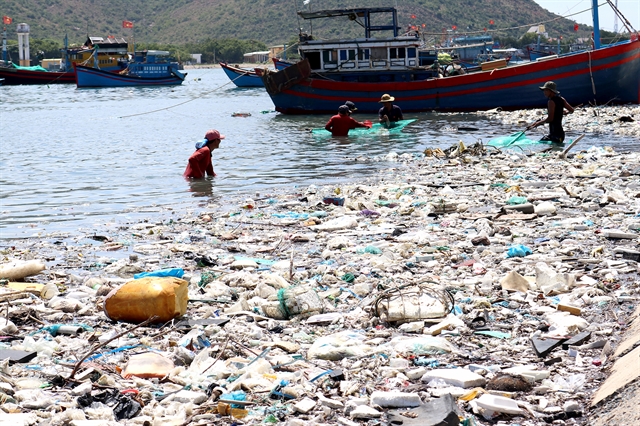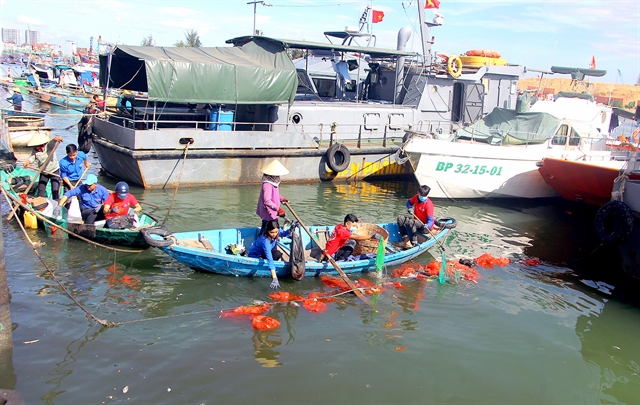 Environment
Environment

The Ministry of Natural Resources and Environment's Vietnam Administration of Seas and Islands has said that the national target of reducing 50 per cent of ocean plastic waste by 2025 was highly ambitious. Achieving this goal would require more comprehensive measures and strong determination from the entire society, including state management agencies, businesses, and citizens.

|
| Plastic waste along the coastal area of Khánh Hải Town, Ninh Hải District in central Ninh Thuận Province. VNA/VNS Photo |
HÀ NỘI – The Ministry of Natural Resources and Environment's Vietnam Administration of Seas and Islands has said that the national target of reducing 50 per cent of ocean plastic waste by 2025 was highly ambitious.
Achieving this goal would require more comprehensive measures and strong determination from the whole of society, including state management agencies, businesses, and citizens.
Phạm Thị Gấm, head of the Vietnam Administration of Seas and Islands’ Policy and Legal Office, said the ministry’s latest national report on the environment showed that about 34 per cent of waste in rural areas and 26 per cent of waste in coastal areas was discharged directly into the environment.
Meanwhile, waste treatment was still highly limited. More than 70 per cent of waste has been buried in landfills, which causes severe pollution as waste could flow into the rivers, streams, and eventually the sea on rainy days.
Under the national plan for ocean plastic waste management, the Government has set a target to reduce ocean plastic waste by 50 per cent by 2025. Of that, 50 per cent of lost or discarded fishing gear would be collected and 80 per cent of coastal tourism businesses would say no to single-use plastic products and non-biodegradable plastic bags.
By 2030, the rate of ocean plastic waste would reduce to 75 per cent. Of that, the disposal of fishing gear into the sea would be put to an end, and all coastal tourism businesses would no longer use single-use plastic products and non-biodegradable plastic bags.
Gấm said the Government has exerted a great deal of effort in addressing plastic waste in oceans. Many models for preventing and combating ocean plastic waste have been piloted in coastal areas and shown initial effectiveness.
Free-plastic islands
Cô Tô District in northern Quảng Ninh Province is among the first localities to say no to plastic waste. A pilot project titled ‘Cô Tô District without plastic waste’ has been implemented on the island since 2020 by the district’s Women’s Union.
A representative of the union said the use of plastic bags was widespread in the district. To change people's habits, the union has promoted waste sorting at the source, restricted single-use plastic bags, and called for household commitments on this issue.
The union has asked the district People's Committee to allocate funds to purchase 1,000 eco-friendly reusable bags and distribute them for free to local households in order to replace the single-use plastic bags.
It has also purchased 3.2 tonnes of eco-friendly bags for businesses in the district's commercial centre, and 650 kg of waste sorting bags for local residents.
The union has installed ‘no plastic’ signs on passenger ships. Tourists were encouraged not to bring single-use plastic items when visiting the island.
Through these activities, the union has encouraged tourists to leave behind over 100kg of plastic bags before reaching the island.
.jpg)
|
| A fish model collecting plastic waste at Mỹ Khê Beach in Đà Nẵng City. VNA/VNS Photo |
Nguyễn Thị Minh Huệ, owner of Cô Tô Center Homestay in Đồng Tiến Commune said she has been replacing single-use plastic bottles with glass ones at her homestay for the past seven years.
She estimated that she had reduced discharge by about 2,000 plastic bottles per year.
The union has also worked with the unions at the grass-roots levels to regularly organise environmental cleanup activities in villages and along the beaches. In particular, the model of Biến Rác Thành Tiền (Making Money from Waste), in which volunteers collected and sold plastic and cardboard boxes to create funds to support disadvantaged children in the area, has gained public support.
Nguyễn Thị Hằng, vice chairwoman of Cô Tô District Women's Union, emphasised that the successful implementation of the no plastic project required unwavering determination from the entire political system and local people.
This was a practical and significant activity that contributed to promoting sustainable tourism development in the district, she said.
Connecting community resources
A project to scale up the community-based model for domestic waste and plastic management has been conducted in five coastal cities in Quảng Ninh, Đà Nẵng cities and Bình Định, Bình Thuận and Bình Dương provinces.
The project, jointly implemented by UNDP Việt Nam, the Norwegian Ministry of Foreign Affairs and Việt Nam Administration of Seas and Islands, has helped local people earn by thoroughly sorting and treating waste.
Local organisations, including the Farmer’s Union and Women’s Union, have worked closely with people and waste workers to promote green habits of waste segregation, collection and recycling as well as expand markets for secondary materials.

|
| Local people collect plastic waste on the waters of Quy Nhơn Port in central Bình Định Province. VNA/VNS Photo |
In central Đà Nẵng City, groups of volunteers have been set up in Ngũ Hành Sơn and Hoà Vang districts to provide training on waste and plastic management, particularly waste sorting at source. With reminders from these groups, 80 per cent of households have been committed to sorting waste in their homes.
In central Bình Thuận Province, the project has raised awareness of the circular economy, environmental protection, and plastic waste reduction for 450 12th-grade students. At the same time, the project has implemented the model of connecting community resources in reducing ocean plastic waste in Phú Quý and Tuy Phong districts, and Phan Thiết City.
Waste sorting has gained success in central Bình Định Province. Since late 2020, different-coloured waste bins with specific labels have been set up in Nhơn Hải Commune in Quy Nhơn City, creating habits of waste sorting for local residents.
Between 3pm and 2am of the next day, local people brought the sorted waste to the bins placed along the coastal roads for collection.
Trần Tố Uyên, a resident in Nhơn Hải Commune, said: "Since waste sorting became our habit, streets have become clean."
Nguyễn Ngọc Nam, Vice Chairman of the People's Committee of Nhơn Hải Commune said currently, all households in the commune are involved in waste collection and sorting at source.
Visitors have praised the local community for having a green, clean, and beautiful environment. The commune has set a target of welcoming around 50,000 visitors this year.
Gấm, head of the Vietnam Administration of Seas and Islands’ Policy and Legal Office said more should be done to gain the national target.
She suggested State management authorities enhance the regulation of plastic production and the collection and treatment of plastic waste. Enterprises should actively change their products to be eco-friendly.
Reducing plastic consumption among consumers would encourage businesses to produce alternative products. Citizens play a direct role in waste collection and sorting at the source, making them pivotal in reducing plastic waste.
Furthermore, local authorities could establish necessary policies to develop environmental protection models. If the locality had large-scale waste treatment models, public-private partnership investment methods could be applied. Businesses could adopt circular economy models for environmental protection as these models would receive supportive policies from the Government.
The sanctions related to waste collection and treatment, including plastic waste, must be strictly implemented. Those who failed to sort waste would be fined VNĐ500,000-VNĐ1 million and those who disposed of plastic waste into the sea would be fined VNĐ1-2 million.
When all the society participated in reducing plastic waste, the goal could be fully achieved, she said. – VNS




